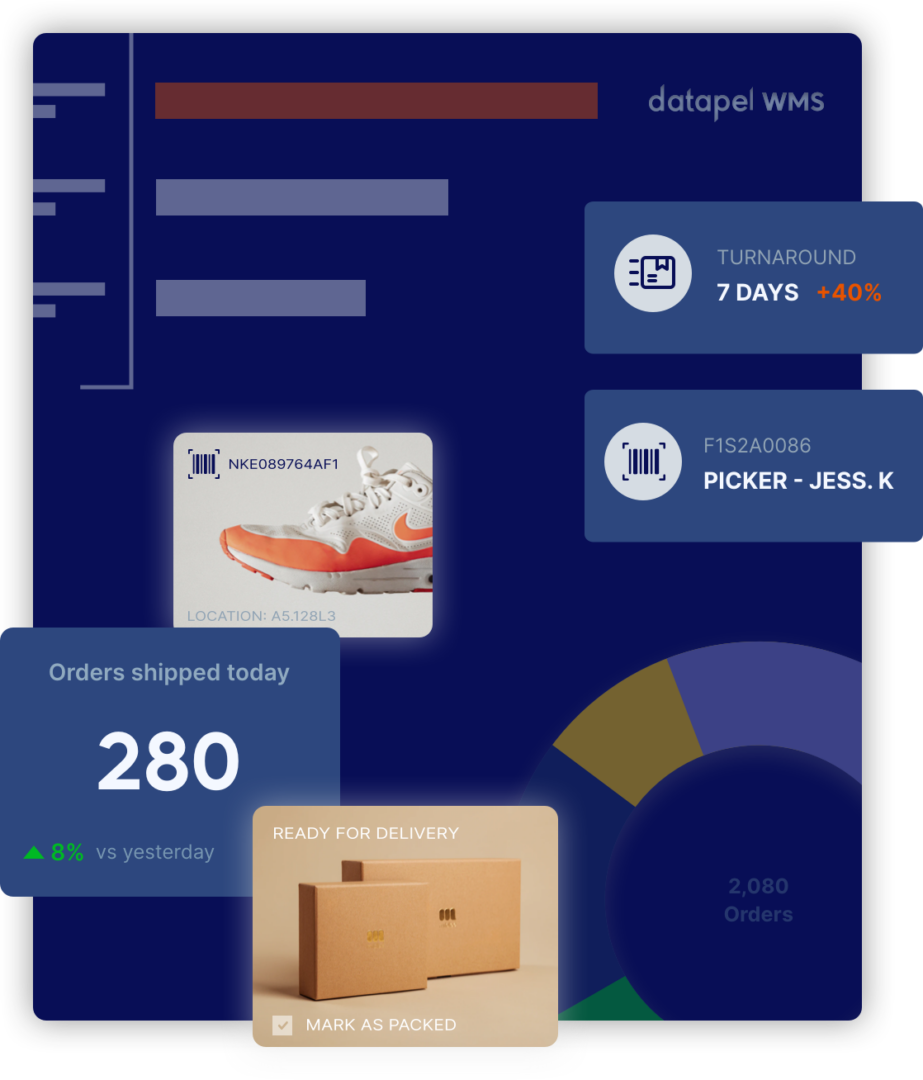Sustainable Business Practices: Turn Intention Into Action
Contents
In today’s challenging economic times, businesses are increasingly turning to sustainable practices to navigate the rough waters of recession.
This article explores the concept of using sustainability strategies in the business realm, focusing on how organisations can achieve more with less, specifically highlighting how Datapel’s Warehouse Management System (WMS) plays a vital role.
The Concept of Doing More with Less
Efficiency in Business Operations
In an era of resource constraints, efficiency becomes the cornerstone of any sustainable business strategy for success. Implementing practices that maximise output while minimising input is not just economical; it’s a necessity.
Cost-Effectiveness
Cutting costs without compromising quality is a balancing act. Sustainable business practices enable companies to find innovative ways to reduce expenses.
Resource Optimisation
Using natural resources to their fullest potential is key to sustainable operations. It’s about smart allocation and avoiding wastage.
Sustainable Business Practices

Environmental Considerations
Sustainability isn’t just about economics; it’s about being environmentally conscious. Businesses need to minimise their carbon emissions and ecological footprint.
Social Responsibility
Companies are expected by corporate social responsibility to operate ethically and contribute positively to society. This includes fair labour practices and community engagement.
Economic Sustainability
Long-term economic health for sustainable businesses is vital. Sustainable practices ensure businesses can weather financial storms.
The Role of Technology in Sustainability

Automation and Efficiency
Technology, especially automation, plays a crucial role in enhancing efficiency. Automated processes reduce manual errors and save time.
Data-Driven Decision Making
Utilising data for informed decision-making is crucial. It helps businesses predict trends and make smarter choices.
The Role of WMS (Warehouse Management Systems)
Warehouse Management Systems, like Datapel, are pivotal in streamlining operations, ensuring efficient inventory control, and reducing costs.
Managing Inventory for Sustainability

Reducing Waste and Overstock
Efficient inventory management leads to reduced waste and prevents overstocking, both of which are crucial for a successful sustainability strategy.
Optimising Storage and Distribution
Smart storage solutions and optimised distribution paths contribute significantly to sustainable development practices.
Tracking and Analysis
The ability to track and analyse inventory helps in making informed decisions, leading to more sustainable operations.
Cost Reduction and Revenue Maximisation

Focusing on cost reduction and revenue maximisation is imperative in the current business climate. Streamlining operations, enhancing customer satisfaction, and recognising the long-term environmental impact and financial benefits of sustainable practices are key strategies for achieving these objectives.
Streamlining Operations
Efficient operations are fundamental to reducing costs. By streamlining processes, businesses can identify and eliminate inefficiencies, leading to significant cost savings.
- Process Optimisation: Reviewing and optimising business processes can uncover inefficiencies. Implementing lean management techniques and automating repetitive tasks can lead to smoother operations and reduced operational costs.
- Supply Chain Management: Efficient management of the supply chain is crucial. By optimising logistics, reducing transportation costs, and managing inventory more effectively, businesses can significantly cut costs.
- Technology Integration: Implementing technology solutions like Datapel’s WMS can streamline operations. Features such as real-time inventory tracking and automated ordering systems not only save time but also reduce the likelihood of errors, which can be costly.
- Employee Training and Engagement: Well-trained employees are more efficient and can contribute to smoother operations. Engaging employees in the process of identifying areas for improvement can also be beneficial.
Enhancing Customer Satisfaction
Satisfied customers are the cornerstone of a successful business model. By focusing on customer satisfaction, companies can not only retain their existing customer base but also attract new ones.
-
Quality assurance is crucial for meeting customer expectations and achieving repeat business. This leads to repeat business and word-of-mouth that spreads like wildfire.
- Responsive Customer Service: Providing excellent customer service, especially in addressing complaints and queries, helps in building trust and loyalty among customers.
- Personalisation and Engagement: Personalised experiences can significantly enhance customer satisfaction. Using data to understand customer preferences and tailoring services or products to meet those preferences can be a game changer.
- Feedback Mechanisms: Implementing effective feedback mechanisms allows businesses to gather insights from customers, helping to improve products and services continually.
Long-Term Financial Benefits
Adopting sustainable practices may require an initial investment but can lead to substantial long-term financial benefits and environmental sustainability.
- Reduced Operational Costs: Sustainable practices often involve reducing resource consumption, which can lower utility bills and other operational costs in the long run.
- Risk Mitigation: Sustainable practices can help mitigate risks associated with environmental regulations and change market preferences towards more eco-friendly products.
- Market Positioning: Being known as a sustainable business can enhance a company’s brand image, opening up new market opportunities and potentially allowing for premium pricing.
- Investment Attraction: Companies that demonstrate a commitment to sustainability often attract investors who are looking for socially responsible investment opportunities.
Incorporating these strategies into business operations can not only help in weathering current economic challenges but also position companies for future generations of long-term success.
Overcoming Challenges in Recession
Adapting to Market Changes: Businesses must be agile to adapt to market changes, especially during economic downturns.
Maintaining Quality and Service: It’s important to maintain quality and service standards, even when cutting costs.
Strategic Planning and Forecasting: Strategic planning and accurate forecasting are crucial for navigating recessions successfully.
Future of Sustainable Business Practices

Trends and Predictions
The future of sustainable business and sustainability practices is shaped by emerging trends driven by technological advancements, consumer expectations, and global economic shifts. Companies need to stay informed and agile to adapt to these changes.
- Integration of Artificial Intelligence and Machine Learning: AI and ML are set to play a pivotal role in enhancing sustainable practices. From predictive analytics for inventory management to AI-driven energy-saving systems, these technologies offer a myriad of applications that can significantly reduce waste and optimise resource use.
- Circular Economy Model: A major shift towards circular economic models is expected. This involves rethinking product lifecycles, focusing on recycling, reusing, and reducing waste. Companies will need to redesign their products and services to fit into this sustainable model.
- Increased Emphasis on Carbon Footprint Reduction: With climate change concerns rising, businesses are expected to increasingly focus on reducing their carbon footprints. This could involve adopting renewable energy sources, implementing carbon-neutral policies, and seeking carbon offset opportunities.
- Sustainable Supply Chain Management: There will be a greater push towards creating sustainable supply chains. This involves ethical sourcing, minimising transportation emissions, and ensuring that all elements of the supply chain adhere to sustainable practices.
- Rise of Green Finance: Investment in sustainable business practices is likely to increase, supported by green financing options. This includes funds and loans specifically aimed at supporting eco-friendly and sustainable projects.
The Role of Innovation
Innovation is the catalyst for progress in sustainable business practices. It’s not just about inventing new technologies; it’s about creatively applying existing ones to improve efficiency and sustainability for sustainable brands.
- Developing Eco-friendly Materials: Innovation in material science will lead to the development of more sustainable, biodegradable, and recyclable materials. This can revolutionise product manufacturing and packaging, making them more eco-friendly.
- Smart Automation: Leveraging smart automation in operations can significantly reduce energy consumption and waste. Innovations in IoT (Internet of Things) and smart devices can lead to more efficient management of resources.
- Blockchain for Transparency: Blockchain technology can be employed to enhance transparency in supply chains, ensuring ethical and sustainable practices at every stage.
Long-Term Vision and Goals
Embedding sustainable practices into business strategies is essential for long-term growth and resilience. It’s about creating a balance between profitability and environmental responsibility.
- Building Resilient Business Models: Companies need to develop business models that are resilient to economic and environmental changes. This includes diversifying energy sources, investing in sustainable technologies, and adopting flexible operational strategies.
- Fostering a Culture of Sustainability: Cultivating a culture that values sustainability at all levels of the organisation is crucial. This means training employees, setting sustainable goals, and encouraging eco-friendly initiatives.
- Stakeholder Engagement and Collaboration: Engaging with stakeholders – from employees and customers to suppliers and investors – in sustainability efforts is vital. Collaboration can lead to shared values and combined efforts in achieving sustainability goals.
- Continual Learning and Adaptation: The landscape of sustainability is ever-evolving. Businesses need to commit to continual learning and adaptation to stay abreast of new developments and integrate them into their practices.
By focusing on these areas, companies can not only contribute to a more sustainable future but also to position themselves for enduring success in an increasingly environmentally-conscious market.
Datapel’s WMS: A Tool for Sustainable Practice
Features that Support Sustainability
Datapel’s Warehouse Management System (WMS) emerges as a potent tool, offering a suite of features that not only enhance operational efficiency but also contribute to more sustainable business practices.
Features that Support Sustainability
- Real-Time Inventory Tracking: This feature allows for precise monitoring of stock levels, helping businesses avoid overstocking or stockouts. By having a clear picture of inventory, companies can make informed decisions, reducing waste and ensuring that resources are used efficiently.
- Automated Ordering System: The WMS’s automated ordering capabilities can significantly reduce manual errors and time spent on inventory replenishment. It ensures orders are placed just in time, reducing excess inventory and minimising the carbon footprint associated with storage and transportation.
- Efficient Space Utilisation: Datapel optimises warehouse space utilisation. It employs intelligent layout planning and stock placement strategies to maximise storage efficiency. This not only reduces the physical footprint of warehouse operations but also lowers energy consumption for heating, cooling, and lighting.
- Enhanced Reporting and Analytics: The system’s robust reporting tools provide valuable insights into inventory trends, enabling businesses to forecast demand more accurately. This leads to more efficient use of resources and a reduction in waste generated from excess products.
- Eco-Friendly Shipping: Integration with shipping options is another key feature. The system can optimise shipping routes to minimise environmental impact.
Customization and Scalability
- Tailored Solutions for Diverse Needs: Datapel’s WMS is designed with flexibility in mind, allowing customization to meet the specific needs of different businesses. Whether it’s a small enterprise or a large corporation, the system can be tailored to fit the unique operational requirements of each organization.
- Scalability for Growth: As businesses grow, their needs evolve. Datapel’s WMS is scalable, meaning it can expand its capabilities in line with a business’s growth. This prevents the need for frequent system changes, reducing waste associated with software turnover and training.
- Integration with Other Systems: The ability to integrate seamlessly with other business systems (like ERP and CRM) is a hallmark of Datapel’s WMS. This ensures that businesses can implement a comprehensive, sustainable management system without the need for multiple disparate tools.
- User-Friendly Interface: A user-friendly interface ensures that all employees, regardless of their tech savviness, can efficiently use the system. This reduces training time and errors, contributing to smoother, more sustainable operations.
Conclusion
In conclusion, sustainable business practices are not just a trend but a necessity, especially in the face of economic challenges. Datapel’s WMS plays a crucial role in this landscape, providing tools and features that support businesses in achieving more with less.

In my role, I oversee the development of insightful blogs that delve into the intricacies of warehouse management. Each piece reflects my dedication to empowering businesses through informative content. Through my team’s extensive experience in the industry, we aim to bring clarity to the complexities of WMS, helping businesses make informed decisions.
Join me on a journey through the ever-evolving landscape of warehouse technology as we explore the latest trends, industry insights, and practical tips to streamline your operations. Feel free to connect, and let’s embark on a collaborative exploration of how WMS can redefine your business efficiency.
Cheers to innovation, efficiency, and the exciting world of warehouse management!







